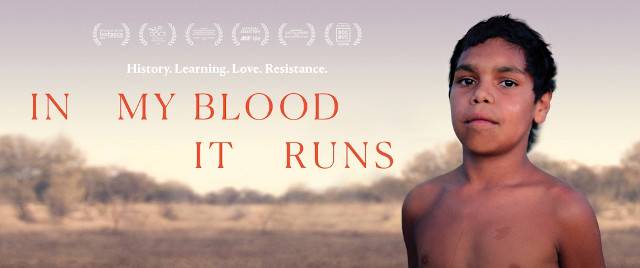In My Blood It Runs

Box office breakthrough In My Blood It Runs moves to an innovative Virtual Cinema release, and announces education program commencing April 28, workplace events and Reconciliation Week screening opportunities.
It's rare for Australian independent documentaries to get made, even rarer that they make it to cinemas and almost unheard of that they garner box office success. In My Blood It Runs was an exception – up against Hollywood blockbusters, it's screen average was number 3 in the country on the opening weekend.
With filmmaker Q&A and general sessions sold out, the number of cinemas booking the film grew week by week, until cinemas were suddenly shut down by the Covid-19 pandemic restrictions.
But audience demand has stayed strong for the film – which follows the life of a charismatic 10-year-old Arrernte/Garrwa boy Dujuan and his family with an intimate look inside their world. The film charts the challenges Dujuan faces in Australia today, including prejudice in school and on the streets of Alice Springs. In My Blood It Runs reveals the ways First Nations communities negotiate the colonial culture and keep their identities and cultures alive through self-determination, the revitalisation of languages and cultural practices. It is a side of Australia that many of us have never seen.
With the abrupt end of the cinema season, the filmmaking team made a swift decision to continue with a virtual cinema release and to progress the education program for the film.
More than 2270 people watched a series of four live screening events with the filmmakers last week and another 3398 people have already watched the film via vimeo on demand over the last fortnight. Thirty percent of all online screening profits will go towards immediate crisis response work by the film's partner organisations Children's Ground and the Akeyulerre Healing Centre in Alice Springs to support communities to prepare for and face the health impacts of coronavirus. A further twenty percent will go directly towards supporting those in the film to stay safe during this uncertain time.
RECONCILIATION WEEK EVENT SCREENINGS
Additional Virtual Cinema Live Q&A events will be held at 6.30pm on June 3 and 4 to mark the end of Reconciliation Week, with a third Q&A screening especially designed to support workplaces to explore the themes in the film happening at 2pm on June 2. For further details and to buy tickets, click here: www.inmyblooditruns.com/screenings
The In My Blood it Runs Reconciliation Week program includes urging schools, workplaces, business and organisations to arrange their own virtual screenings. The filmmakers are making themselves available to participate in live Q&As to support these screenings. Details here:
https://inmyblooditruns.com/screenings#showthefilm
EDUCATION PROGRAM LAUNCHES WITH PROFESSIONAL LEARNING EXPERIENCE FOR TEACHERS ON APRIL 28, 'VIRTUAL EXCURSIONS', CLASSROOM RESOURCES AND FREE SCREENINGS
As with Maya's earlier film Gayby Baby, there will be extensive education outreach with a free live Q&A webinar - Professional Learning for teachers 'introduction to teaching with In My Blood It Runs in the classroom – at 2pm on April 28 and free screenings of the film for teachers and students available between April 30 and June 30. Throughout Reconciliation Week, there will be free 'virtual excursions' with filmmakers Q&As and targeted moderators for the curriculum areas Aboriginal Studies, Science, English and Media Studies, History and Civics and Legal Studies. Classroom resources are available alongside a Professional Learning resource for teachers written by Reconciliation Australia Narragunnawali.
Details here: https://inmyblooditruns.com/education
The school screenings launch the Learn Our Truth campaign. The film is partnering with the National Indigenous Youth Education Coalition, an Indigenous youth-led organisation, to campaign for the inclusion of Aboriginal and Torres Strait histories in the Australian high school curriculum. Currently there is an absence in the curriculum of Aboriginal and Torres Strait histories before grade 10, and it only then becomes available in a modern history elective.
"The film is beautiful to watch on the cinema screen but it's intimacy with Dujuan and his family that have also made the event screenings we've had to date and on-demand viewing so special as well. It's been an incredibly warm experience to share the film with audiences in Australia and around the world. We know it will also have a special place also in workplaces and school life," says director Maya Newell.
The team also attribute the success of In My Blood It Runs to the fact that the release was built alongside the film's social impact goals and designed to further them. These goals - to improve the education and juvenile justice systems and address racism - were envisaged and designed by the Arrernte and Garrwa contributors in the film.
Carol Turner, Dujuan's grandmother, features in the film and was a collaborating director alongside Maya. She says: "On behalf of our Arrernte families, we hope you enjoy watching our story while we are all stuck inside our houses. Thank you all for supporting the film and the inequalities we want to see changed for our children. Kele Mwerre."
MORE



